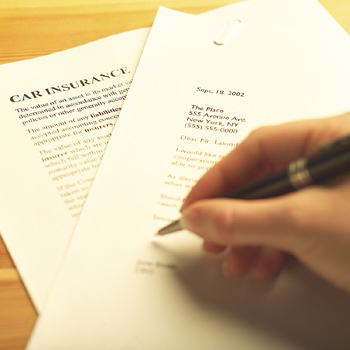5 reasons to avoid salvage-title cars
Jun 6th, 2011 | By Angela | Category: Car Buying & Selling TipsYou just found a late-model BMW selling for thousands of dollars less than the rest. The description sounds good. The miles are low and the photos are spotless.
But then there’s the asterisk: It’s got a salvage title.
The seller assures you the damage was cosmetic, that no structural damage occurred. He’s certainly offering a substantial break on price. What should you do?
Most salvage title cars are priced at least 5 percent below market, which seems like a good deal. But in most cases the true value is much, much less. Consumer Reports calculates that a salvage-title car is worth 50 percent of its Kelley Blue Book value, at best.
And it is extremely difficult to determine whether the damage was simply cosmetic, as almost every seller will claim, or structural. If you decide to buy, you’ll find few banks will want to finance your find, and car insurance companies won’t even try to guess what it’s really worth.
What is a salvage-title car?
When a car has been in an accident, stolen or weather-damaged and repairs will cost more than the vehicle is worth, the car insurance company will total it and take possession. Insurers then sell these cars at auction to salvage yards or rebuilders. The car will be issued a salvage title to warn future buyers that an insurance company has declared the car a total loss.
Most states have laws that set a threshold on the amount of damage needed to declare a car totaled, usually between 51 percent and 80 percent of the car’s actual cash value.
There are occasions that a perfectly good car gets a branded title. A good hailstorm can do thousands of dollars of cosmetic damage, leaving the mechanicals as good as new. A fender-bender can cost more to repair than an old car is worth.
According to a Consumer Federation of America report, 2.5 million vehicles are totaled each year. Roughly 1.5 million are repaired and put back on the road. The latest Crash Report from CCC, a collision claims-management consultant, shows this number has grown dramatically over the past decade. In 2000, only 9 percent of all vehicles appraised after wrecks were flagged as a total loss. By 2010, this number had grown to 14 percent.
Largely, that’s because there are more older vehicles on the road. For vehicles aged 7 years or older, collision damage results in a total loss 68 percent of the time, CCC reports.
Can’t finance it — or insure it
If you are hoping to finance and fully insure a salvage-titled car, you may be in for a surprise. Few auto insurance companies are willing to write collision and comprehensive coverage on a salvage-title car.
Kyle Mediger, an independent agent and owner of The Insurance Advisors, says “insuring a salvage-title vehicle can be a real challenge. Most insurers are reluctant to write comprehensive and collision policies because it is so difficult to put a value on these vehicles.”
Financing a salvage-title car also is difficult.
Garry Smith of Hilo, Hawaii, of has owned several salvage-title cars over the years and currently drives a 2005 Dodge Dakota Quad Cab with a salvage title. If you plan on buying one, his advice is to be prepared to pay cash. Without comprehensive and collision insurance to protect the car, it’s unlikely you’ll be able to find a lender.
Safety? You’re rolling the dice
Safety is one of the best reasons to avoid salvage title cars. These cars can be dangerous.
Many rebuilders cut corners in order to fatten the bottom line. While structural and alignment issues are common, rebuilders also skimp on airbags. In 2003, Bobby Ellsworth was killed when the rebuilt salvage truck he was riding in crashed in San Diego. It turned out the airbags had been stuffed with paper towels.
The California Highway Alliance estimates that one out of every 25 previously damaged vehicles has phony or dummy airbags installed. Lax federal oversight and spotty inspection requirements make it easy for dishonest rebuilders to skimp on this essential safety device.
Almost no resale value
While the estimates vary, a salvage-title car is worth considerably less than a car that was never in an accident.
These cars are so difficult to value that Kelley Blue Book doesn’t provide pricing on them. “There are too many variables and unknowns,” says a KBB spokesperson. “From what we hear in the marketplace, wholesalers are paying 30 percent (to) 50 percent of the KBB book value.”
An honest seller will never get the current market price for a vehicle that has a salvage title attached to it. People willing to take a risk on a salvage title will demand a huge discount.
It’s your car — forever
If you buy a salvage-title car, plan on owning it until the wheels literally fall off. Because these cars are hard to finance, they can also be a challenge to sell.
“I have tried to sell several,” Garry Smith says, “and the deals fell through when the bank found out they were salvage titles and couldn’t be fully covered by car insurance to protect the bank’s interest in the vehicle.”
The pool of potential buyers is quite small when a salvage title is involved.
Fraud is common
You may be driving a salvage-title car already and not know it. Title washing can make it difficult to determine if your car has been in an accident and rebuilt.
State titling requirements vary, which means that a car that has a salvage title in one state can be driven to a state where an inspection is not required and a clean title will be issued. A car with a clean title is worth thousands more, which makes driving a car to another state well worth the trip for shady rebuilders.
Large insurance companies take advantage of loopholes as well. In 2006, State Farm settled a lawsuit with 49 state attorneys general after admitting it had resold between 30,000 and 50,000 totaled cars without salvage titles.
General tips
We would recommend that you avoid salvage title cars at all costs. As you shop:
- Have a trusted professional mechanic check out any vehicle you are considering. The better the deal you’re getting, the more you should insist on an inspection.
- Get a vehicle history report. The money will be well spent if you discover a salvage title.
- Check with your local DMV in regards to their salvage title laws. Each state has different guidelines for salvage titles. Understand the local policies before you buy.
- Check the National Motor Vehicle Title Information System. This federal database was supposed to cut down on title fraud. While it has helped, it is incomplete, as not all states participate. Search the database for the VIN of any car you are interested in.



Thanks for highlighting all the disadvantages and losses related with the salvage cars from this post. People should confirm properly and be sure of all the terms and conditions related with the salvage title cars before taking any action regarding this.
[Reply]